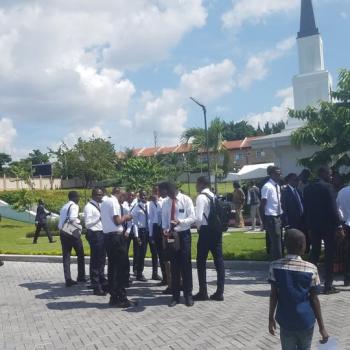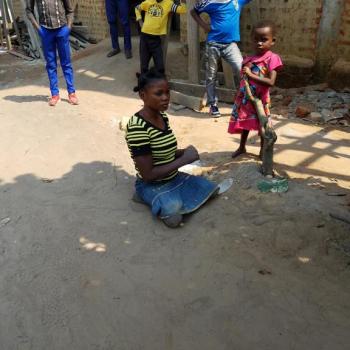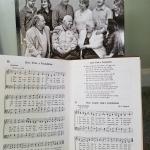 “Thou shalt break them with a rod of iron; thou shalt dash them in pieces like a potter’s vessel.” (Psalms 2:9)
“Thou shalt break them with a rod of iron; thou shalt dash them in pieces like a potter’s vessel.” (Psalms 2:9)
I did not learn of the bulldozing of the LDS chapel at Dale’s finca until a decade after it had happened. Because I had agreed to teach full time at BYU-Hawaii (I usually teach part-time at BYU-Provo), I had an interview by a general authority. After a few minutes, we both learned that we had something in common–our association with Dale at different points in his life. I have decided not to name the general authority.
He told me about receiving a call from a member of the Quorum of the Twelve and being instructed to bulldoze the chapel. He asked if he might save the piano, and was told that he could. He asked if he might save the windows. The reply was, “We told you to bulldoze the chapel.”
The division had already been set. Dale had his own flock. By that time, polygamy was being openly preached, though Dale was still raising money in the US, presenting himself as a Mormon in good standing. I don’t know who went to the plantation to officially make the division between those who were following Dale and those who were following the teachings of the LDS Church, for there was now a gap between the two groups. It was done, however, and those who chose Dale were excommunicated.
What a tragedy it was! Dale had made huge sacrifices to be in Guatemala because of his experiences as a Mormon missionary, and he had helped the people there as a Latter-day Saint. His subtle turns happened at various junctures, and no one knows about them but Dale.
The man who did the actual bulldozing had the last name “Justice.” When he brought his bulldozer onto the church property, Dale ran out of house to see what was happening. He yelled (as I have been told) “Who are you?” The man gave his name. Dale said, “Well, that’s the most ironic thing I’ve ever heard. A man named Justice is going to do one of the most unjust things imaginable!”
The chapel was bulldozed. As per instruction, flower seeds were spread over the place where the chapel had been. It is my understanding that many years thereafter, a new chapel was built on the firm understanding that the Church of Jesus Christ of Latter-day Saints in that part of Guatemala was NOT a part of Dale’s foundation. The Church would not take credit for the good Dale did, nor would it accept blame for the questionable activities.
This separation of entities had a profound impact on me for the rest of my life. As I went on to write about black LDS pioneers and was published by Deseret Book, a church company, I pondered the necessary division. In connection with our books, my co-author and I did many firesides. We set up rules. We would never connect our firesides with any marketing of any kind. We would tell the stories without mentioning that our books were for sale. We also developed a quick code to keep us in line. As people would come to congratulate us on our books (in a bookstore) or on our firesides (in a chapel), we would turn to each other and mouthe, “Don’t inhale.”

The words are paraphrased from a talk by President Deiter Uchdorf in which he says:
When I was called as a General Authority, I was blessed to be tutored by many of the senior Brethren in the Church. One day I had the opportunity to drive President James E. Faust to a stake conference. During the hours we spent in the car, President Faust took the time to teach me some important principles about my assignment. He explained also how gracious the members of the Church are, especially to General Authorities. He said, “They will treat you very kindly. They will say nice things about you.” He laughed a little and then said, “Dieter, be thankful for this. But don’t you ever inhale it.”
That is a good lesson for us all. . .in any calling or life situation. We can be grateful for our health, wealth, possessions, or positions, but when we begin to inhale it—when we become obsessed with our status; when we focus on our own importance, power, or reputation; when we dwell upon our public image and believe our own press clippings—that’s when the trouble begins; that’s when pride begins to corrupt.
Most of us will learn about pride throughout our lives. We will see it in others, and if we look closely and honestly at ourselves, we will undoubtedly find it, perhaps even hiding behind our good works.
In my final installment, I will talk about the principles I learned through this experience in Guatemala.
To be continued. . .












